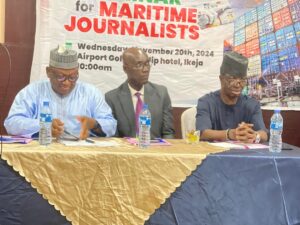

AS ECONOMIC REGULATOR, WE ARE TO CREATE AN EFFECTIVE REGIME TO CONTROL TARIFFS, RATES & CHARGES AT THE PORTS-UKEYIMA SAYS @ MARITIME JOURNALISTS’ SEMINAR

I’m indeed very delighted to present a paper on “the Nigerian Shippers’ Council (NSC) in transition, Issues, Prospect and Challenges” at this occasion of the 2024 Annual Seminar for Maritime Journalist organized by the First Mediacon Network Ltd. I would like to observe a point of similarity that both “the Annual Maritime Seminar for Justice organized by the Nigerian Shippers’ Council (NSC) and the Annual Seminar for Journalist being organized by the First Mediacon Network Ltd, both share a common objective, to provide a platform for acquiring knowledge on contemporary issues within the maritime industry.

The Nigerian Shippers’ Council (NSC) is indeed an agency constantly in transition. It has transited from being an agency primarily responsible for protecting the interests of shippers on matters relating to international trade transaction, to trade facilitator, through the promotion of the development of Inland Dry Ports (IDPs) and other cargo logistics across the 6 geo-economic zones in Nigeria, and to being appointed a port economic regulator by the President of the Federal Republic of Nigeria in 2014.

All these were in recognition of the contributions of the Council to the economic development through its various interventions in cost moderations and ensuring quality service delivery which ultimately impacts positively on inflationary trend in Nigeria.
Nigeria is a nation greatly endowed with abundant maritime potentials, the ability to tap into these potentials requires a lot of technical capacity development, sensitizations, knowledge sharing, information dissemination and understanding. The Nigerian Shippers’ Council (NSC) by virtue of its appointment as an economic regulator of port has a significant role to play to provide requisite information and guidance for the investors to tap into the resources for economic development. For this purpose, and in order to appreciate the roles of Nigerian Shippers’ Council as an agency in constant transition since its establishment, this paper has been structured along the following broad discussions;
The period before the establishment of NSC: This features the historical background of Nigerian Shippers Council, the event that gave rise to its creation by Decree 13 of 1978 (now the Nigerian Shippers’ Council Act Cap N133 laws of the Federation of Nigeria 2004), its statutory functions and the challenges of protecting the interest of shippers.
The period of port reforms in Nigeria in 2006, and its implications on the roles of the Nigerian Shippers’ Council.
The appointment of the Nigerian Shippers Council (NSC) as port economic regulator Issues, challenges and future prospects and lastly
The request for the amendment of the Nigerian Shippers’ Council Act N133 LFN (as amended) to transit to the Nigeria Port Economic Regulatory Agency.
THE HISTORICAL BACKGROUND TO THE ESTABLISHMENT OF THE NIGERIAN SHIPPERS’ COUNCIL.
The Nigerian Shippers’ Council was established by Decree 13 of 1978 (now (the Nigerian Shippers’ Council Act Cap N133 laws of the Federation of Nigeria 2004, with the primary mandate of safeguarding the interest of importers and exporters on matters affecting the shipment of imports and exports to and from Nigeria. It is also to advise the Federal Government of Nigeria (FGN) on all matters relating to Freight rates, terms of shipments, class and quality of vessels, port charges and facilities, availability, adequacy, accessibility and affordability of shipping services and general on problems of the shipping industry in Nigeria.
The period before the establishment of Nigerian Shippers’ Council in 1978 was characterized by deteriorating quality of shipping services and unmitigated increases in ocean freight rates by foreign ship owners who operated a schedule liner services to the Nigerian ports. The impacts of freight rate increases, undue imposition of demurrages on cargoes and other sharp practices by vessels operators created balance of payment problems for Nigeria and other African countries economies.
To address these problems, the United Nation Conference on Trade and Development (UNCTAD) intervened, by developing a new world maritime order known as UN Code for liner Conference in 1965. The UN-Code encouraged developing countries to form national Shippers’ Council in their respective countries to serve as countervailing forces to the unfair trade practices perpetrated by the providers of shipping services, mostly from the developed countries.
The Nigeria military government implemented this code in 1978 through the establishment of the Nigerian Shippers’ Council with the responsibility to protect the interests of Nigerian shippers on matters relating to international trade and cargo shipment to and from Nigerian seaports. Its statutory functions therefore are:
To provide the forum for the protection of the interests of the shippers on matters affecting the shipment of imports and exports to and from Nigeria;
To encourage the formation of Shippers’ Associations all over the
country;
To provide a forum for consultation between the conference and non-conference lines, tramp-owners, the Nigerian Ports Authority and the Government of the Federation on matters of common interest;
To negotiate and enter in to agreements with Conference Lines and non-Conference Lines, shipowners, the Nigerian Ports Authority and any other bodies on matters affecting the interests of shippers;
To advise the Government of the Federation, through the Minister, on matters relating to the structure of freight rate, availability and adequacy of shipping space, frequency of sailings, terms of shipment, class, and quality of vessels, port charges and facilities and other related matters;
To assess the stability and the adequacy of existing services and make appropriate recommendations in that behalf;
To consider the problems faced by shippers with regards to coastal transport, inland waterways and other matters relating generally to the transportation of goods by water and advise the Government on possible solutions thereto;
viii. To promote and encourage the study and research problems affecting shippers in Nigeria;
To arrange from time-to-time seminars and conferences on any matter relating to its functions in Nigeria;
To carry out such other activities as are conducive to the discharge of its functions.
It needs to be stressed that the above functions performed by the Council, are operationalized under the following;
Regulatory services; Nigerian Shippers Council sets, monitors and enforce standards of service delivery.
Stakeholders’ support services; the NSC monitors freight rates, intervenes in the imposition of surcharges and other shipping additional by shipping lines and provide information for shippers to guide them in their business decision making
Advocacy and advisory services; the NSC advices on the commodity market trend.
Border information center [BIC]; the BIC facilitates collaboration between stakeholders involved in cross border trade. It also resolves problems at the border, reduce cost and delays and streamline rules and procedures.
Disputes resolution; the NSC establishes disputes resolution mechanism for the resolution of case.
Port economic regulator; the NSC promotes efficiency in the provision of port services and encourages private sector investment in the port sector.
Protection of importers and exporters in Nigeria as well as their goods.
In addition to its enabling act, the Nigerian Shippers’ Council carries out its function using other subsidiary legislations as follows;
The Nigerian shipper’s council [freight stabilization fees on import and export 1986]
The Nigerian shipper’s council [freight stabilization fees on import and export 1995]
The Nigerian shipper’s council [Local Shipping Charges on Import and Export Regulations 1997]
The Nigerian shipper’s council [Inland container Depot regulations 2007]
The Nigerian shipper’s council [container freight statutory regulations 2007]
The Nigerian shipper’s council port economic regulations order 2015]
The Nigerian shipper’s council [port economic regulations 2015]
The Nigerian Government Port Reform Policy in 2006, and its
implications on the roles of Nigerian Shippers’ Council
In many countries all over the world, governments and public port authorities have retreated from port operations. The core driver is the belief that enterprise-based services and operations will allow for greater flexibility and efficiency in the market through competition. Ports which have been traditionally run like a government department will now be operated by private entities. The global best practices are to have a regulator that will set tariffs, standards of service, regulates entry and exit and ensure efficiency service, regulating relationships between providers and consumers of shipping services. Recognizing these issues, the need for a regulator become imperative.
In adopting the global trend in port operational management, the Federal Government of Nigeria carried out its port reforms programme in 2006, through the concession of the Ports cargo handling operations to private terminal operators for period ranging from 10-25 years.
The concession of cargo handling operations since 2006 when the Private sector took over the operations of terminals had left the Ports without a regulator. The various service providers namely: NPA, Private terminal Operators (Seaport and off-dock bonded terminals), Shipping Companies, Freight Forwarders, Truck haulers and Groupage operators all set their tariffs and also determined their standard of service deliveries regardless of whether it meets the industry quality standard or not.
Consequently, the Stakeholders sought the need to establish an economic regulator who will set standard on port charges and quality of service delivery for compliance by all operators to enable the Government achieve the purpose for which it carried out the reform programnmes in Nigerian Seaports.
Thus on 20th of February 2014, the Federal Government of Nigeria (FGN), appointed Nigerian Shippers’ Council (NSC) an Interim Port Economic Regulator pending the passage of National Transport Commission (NTC) bill by the National Assembly. The appointment was however, backed with Presidential Order on Nigerian Shippers’ Council (port economic regulator) order 2015, aimed to establish a robust regulatory framework to enhance port efficiency mitigates negative impacts of the concession and maximize the benefits of Nigeria’s port reforms.
THE ROLES OF NIGERIAN SHIPPERS’ COUNCIL (NSC) AS ECONOMIC REGULATOR OF PORTS INDUSTRY.
By virtue of its appointment as economic regulator of Ports, the NSC is expected to create an effective regulatory regime for the control of tariffs, rates, charges and other related economic services at the ports. It is also to in addition to its statutory functions monitor the implementation of the commercial components of the lease agreements between the Federal Government of Nigeria (FGN) and the private terminal operators.
Specifically, the NSC was required to:
Provide guidelines on setting and modification of tariffs, rates and charges for
service providers in the Nigerian Port Sector
Monitor the tariffs and charges of all the Port service providers to prevent
arbitrariness, and ensure conformity to industry best practices.
Monitor to ensure that the costs burden arising from poor services by the operators are not passed to the consumers.
Monitor and enforce standard of service delivery to ensure the availability, affordability, accessibility, stability, predictability and adequacy of service.
Issue guidelines and control to create a forum for healthy competition amongst the operators, prevent use of dominant power, service bundling and discrimination and
Monitor and ensure compliance by parties with the provision of port concession agreements.
Issues and Challenges Facing the Nigerian Shippers’ Council in the Performance of its Regulatory roles
The contribution of an effective regulatory/legal frameworks to successfully implement the government reform programme and ensure satisfactory levels of efficiency while upholding public interests can-not be over-emphasized.
The decision about reform strategy, industry structure and regulatory framework are closely linked. Therefore, regulatory issues, options and their consequences should be considered at the early stage of the reform processes. Where regulatory issues are not considered before the final concession contract, a couple of issues tend to manifest later. Such issues as:
Legal challenges may get in to the way
Government’s regulatory role will become fussy
Difficulty to formulate strategies for intervention etc may also surface.
Such were part of the issues the Nigerian Shippers’ Council were confronted with while undergoing significant transformation processes. The NSC faces several issues and challenges that nearly threatens its ability to fully realize its mandate. These include:
Regulatory resistance and Compliance
One of the biggest challenges for the NSC is compliance with its regulatory mandates. At the initial stage of implementing her regulatory functions, the Council encountered some sorts of resistance, particularly from providers of shipping and port services, likewise some government agencies were not left out.
However, the narrative continued to change with time, regulated services providers overtime is coming to terms with the functions of the council as the industry economic regulator.
The gap created by non-regulating the commercial components of port concession.
The non appointment of Port economic regulator since 2006-2014 when the Private sector took over the operations of terminals had left the Ports without a regulator. The various service providers namely: NPA, Private terminal Operators (Seaport and off-dock bonded terminals), Shipping Companies, Freight Forwarders, Truck haulers and Groupage operators all set their tariffs and also determined their standard of service deliveries regardless of whether it meets the industry quality standard or not. The tasks of correcting the service providers to comply with the standard rules has become an issue whivh NSC is still battling with up till now.
Legal Framework
The Federal Government made the Nigerian Shippers’ Council the Nigerian port economic regulator in 2015, but this status needed to be formalized through legislation. Therefore, the need for a strong legal framework for the Council as the nation’s Port Economic Regulator is required. There is an urgent need for the passage of the Nigerian Shipping and Port Economic Regulatory Agency Bill 2023 which seek to repeal the Nigerian Shippers’ Council Act and establish a regulatory agency for the Nigerian ports.
Infrastructure Deficiencies
Nigerian ports are plagued by poor infrastructure, including outdated cargo handling equipment, inadequate road networks, and insufficient storage facilities. While the NSC can regulate economic activities, it has limited control over the physical infrastructure, which is largely under the purview of other government regulatory agencies, including Nigerian Ports Authority (NPA), Federal Ministry of Works, Nigeria Railways service and private investors. The NSC’s ability to drive reforms and improve port operations is therefore constrained by the broader infrastructural deficiencies within the port system.
Lack of Coordination Among Stakeholders
Effective port regulation requires close coordination between the NSC, the NPA, customs, terminal operators, shipping companies, and other stakeholders. However, there is often a lack of synchronization among these entities, leading to inefficiencies, conflicting policies, and a fragmented regulatory environment. There is a need to foster better collaboration and communication between all stakeholders to ensure smoother port operations.
Political Interference and Bureaucracy
Changes in government, shifting political priorities, and bureaucratic hurdles delays/disrupt the implementation of policies meant to improve port operations.
High Cost of Doing Business
High tariffs, port charges, and inefficiencies at the ports increase the cost of doing business in Nigeria. While the NSC is responsible for overseeing tariff structures and pricing, it faces the challenge of balancing the interests of port operators, shippers, and the government while trying to make the ports competitive. Reducing costs for importers and exporters while ensuring sustainable revenue generation for port authorities remains a delicate balancing act.
Port Congestion and Inefficiency
Nigerian ports continue to struggle with congestion and inefficiency, despite efforts to streamline operations. Although the NSC is not directly responsible for managing traffic, it is charged with improving port competitiveness, which includes addressing delays, demurrage charges, and other inefficiencies that arise from congestion. The Council is work closely with terminal operators and other agencies to mitigate these issues.
Limited Private Sector Participation
While the NSC has the mandate to regulate and foster private sector involvement, there remains limited participation from private investors due to regulatory uncertainty, inadequate infrastructure, and challenges related to port security and safety. Encouraging more private sector investment in port operations and infrastructure development is crucial for improving efficiency, but it requires overcoming barriers that limit investor confidence.
Technological Limitations
The adoption of modern technology in port operations is still relatively low, hindering operational efficiency and transparency. The NSC is tasked with promoting the digitalization of port processes, but challenges such as inadequate internet infrastructure, resistance to change among stakeholders, and a lack of skilled personnel in the tech field hamper progress in this area.
Security and Corruption Issues
Security challenges, including cargo theft, piracy, and general lawlessness, persist at Nigerian ports. These security risks negatively affect port operations and increase the cost of shipping. Additionally, corruption among port officials and stakeholders remains a problem, with illegal fees, bribery, and rent-seeking behavior complicating the NSC’s regulatory functions and undermining reforms.
4. Prospects for the Nigerian Shippers’ Council
Despite the challenges, there are several promising prospects for the Nigerian Shippers’ Council, many of which stem from the ongoing transition in the maritime and logistics sectors. These opportunities, if leveraged effectively, could significantly enhance the role of the NSC in Nigeria’s economic growth.
Port Economic Regulatory Agency bill
The Port Economic Regulatory Agency Bill if passed, will empower the NSC to take on a more significant regulatory role in Nigeria’s ports, overseeing tariffs, service standards, and port efficiency. This would enhance the governance of port operations, improve infrastructure development, and ensure fair competition among stakeholders.
The NSC would also play a central role in making Nigerian ports more globally competitive by aligning them with international standards. Overall, the bill would position the NSC to contribute significantly to improving the performance and economic outlook of Nigeria’s port sector.
Implementation of Cargo Tracking Note
The Nigerian Shippers’ Council (NSC) has unveiled plans to kick off the implementation of the International Cargo Tracking Note (ICTN). The Cargo Tracking Note is an automated scheme, which can determine the type and volume of cargo that are imported into the country through seaports within a specific period. The CTN will also boost Nigeria’s security and enhance the Federal Government’s revenue from the seaports.
The commencement of the International Cargo Tracking Note is in line with President Tinubu’s administration of renewed Hope Agenda, which seeks to diversify the revenue base of Nigeria’s economy.
National Single Window
The Nigerian Shippers Council (NSC) is promoting the effective operationalization of the National Single Window (NSW) in the Country.
The NSW Trade Portal is a cross-government website that provides a single access point for trade participants to access resources and services from Nigerian government agencies
Implementation of Enterprise Management System
Efforts are also in place by NSC to implement some new innovations such as the adoption and implementation of Enterprise Content Management (ECM), to improve internal work processes and procedures of the Council
Digital Transformation and E-Commerce
The global shift toward e-commerce and digital trade presents an opportunity for the NSC to enhance its digital capabilities and lead the way in automating port operations, customs processes, and supply chain management. Through the adoption of blockchain, Internet of Things (IoT), and other emerging technologies, the NSC can facilitate faster, more transparent, and cost-efficient trade.
b. Public-Private Partnerships (PPP)
The NSC’s involvement in fostering public-private partnerships (PPP) in the development of port infrastructure, logistics facilities, and transport networks presents an opportunity for collaboration with private investors, which could help alleviate infrastructure challenges. These partnerships could also extend to training and capacity-building programs for shippers, freight forwarders, and other industry stakeholders.
c. Regional Trade Expansion
With the AfCFTA agreement opening up new trade opportunities across the African continent, the Nigerian Shippers’ Council has the potential to spearhead initiatives aimed at improving intra-African trade, reducing logistics costs, and enhancing Nigeria’s position as a key player in African trade. The NSC’s role could be crucial in facilitating trade agreements, creating harmonized standards, and easing cross-border shipping processe
Sustainability and Green Shipping
As the global shipping industry increasingly focuses on sustainability, the NSC has an opportunity to lead Nigeria’s shipping sector toward green practices, including the adoption of eco-friendly vessels, renewable energy solutions, and waste management systems in the ports. Such efforts will not only improve Nigeria’s environmental standing but also make its maritime sector more attractive to international investors and trading partners.
TRANSITION TO NIGERIAN PORT ECONOMIC REGULATORY AGENCY
Recognizing the legal regulatory gap in the Nigerian Shipper’s Council, there is an urgent need to repeal the existing NSC`s Act in order to empower the Council to be able to discharge its mandate as Port Economic Regulator. Consequently, the bill which seeks to repeal the Nigerian shipper’s council act cap 133 laws of the federation of Nigeria [LFN] and enact the Nigerian port regulatory agency act is already passed by house of assembly and is awaiting concurrence of the senate.
The Port Economic Regulation Bill when passed into law will promote efficiency and streamline processes in the nations maritime sector. These roles that they are playing as economic regulators, once we have the law in place will give the Council the necessary clout to regulate the sector effectively. The idea of pushing for its transmutation to Nigerian Port Economic Regulatory Agency is to enhance efficiency and competitiveness of the nation’s port.
Meanwhile, before the coming into the law, the council has been having constructive engagement with all stakeholders to ensure efficiency at the nations port. Recently, an agreement was signed on Friday 23rd, August 2024 by the Maritime Workers Union of Nigeria (MWUN) and the Shipping Agencies, Clearing and Forwarding Employers Association (SACFEA) for Minimum standards of conditions of service for workers in the shipping industry.
This is to ensure labor stability in the sector to mitigate incessant labor unrest. Looking forward things would change holistically. There will be effective regulation, streamlining of ports process, removal of checkpoints, free port access roads, automation as well as addressing other anomalies at the nations port.
Recommendations:
Strengthen Infrastructure Development: The NSC should continue advocating for sustained investment in port and transport infrastructure, leveraging public-private partnerships to address bottlenecks and capacity issues.
Enhance Digitalization: Further investment in digital technologies should be prioritized to modernize operations, reduce inefficiencies, and improve transparency within the shipping and logistics sectors.
Capacity Building Initiatives: More comprehensive training programs targeting industry stakeholders should be implemented to improve skills and knowledge, particularly in logistics, shipping management, and digital tools.
Collaboration with Regional Bodies: The NSC should continue to collaborate closely with regional trade bodies to maximize the opportunities presented by the AfCFTA, ensuring that Nigerian shippers are well-positioned in the global marketplace.
Promote Sustainability: A more aggressive push towards green shipping initiatives will position Nigeria’s maritime sector as a sustainable and responsible part of the global supply chain.
8. Conclusion
The Nigerian Shippers’ Council is at a pivotal moment in its history, as its transitions to meet the evolving demands of a dynamic global trade environment. While significant challenges exist—ranging from infrastructure deficits and policy inconsistencies to security concerns—the prospects for the future are promising. By embracing technological advancements, strengthening regional integration, and focusing on sustainability, the NSC has the opportunity to reposition itself as a world-class regulator and facilitator of trade. The successful implementation of these prospects will require strong collaboration with key stakeholders, continued advocacy for policy reforms, and a commitment to enhancing the capacity of Nigeria’s maritime and logistics sectors.
Through a strategic focus on these areas, the Nigerian Shippers’ Council can continue to play a central role in Nigeria’s economic development, enhancing the competitiveness of Nigerian shippers and ensuring that the country remains a significant player in global trade.

